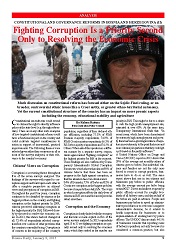
DPC BOSNIA DAILY: Constitutional And Governance Reforms In Bosnia and Herzegovina (II)
Bosnia Daily: January 9, 2015 – Constitutional And Governance Reforms In Bosnia and Herzegovina (II)
More...We kindly inform you that, as long as the subject affiliation of our 300.000+ articles is in progress, you might get unsufficient or no results on your third level or second level search. In this case, please broaden your search criteria.

Bosnia Daily: January 9, 2015 – Constitutional And Governance Reforms In Bosnia and Herzegovina (II)
More...
(English edition) This report contains the analysis of data collected during the month of October 1999. One should have in mind this time frame-when considering the findings, drawing different generalizations or setting guidelines for possible actions. Sets of values of members of the observed generation, their social awareness, perception of the past and present, their stance on the West, and above all their potential to bring about changes are essentially determined by some long-standing and less intensive structural factors. To put it simply a generation of people who today have between 25 and 35 years, and who represent the future of the country, was to a large extent formed under the influence of structural features of the society eroded by constant wars and war threats, protracted economic crisis, internal conflicts and strife and total confusion in the sphere of social awareness and public moral. The generation which in the last decade came of age in such a society per force had to reflect its essential characteristics, despite a relative autonomy which each age groups had as its inherent characteristic. Young people and even relatively young people, to which the respondents of this survey belong, have a determined biological and psychological potential which can help them partially overcome the given moment of time and which usually indicates some of their future contents and values in the present day. In that sense one could expect that the mind-set of the observed generation substantially differs from so-called social conscience. But in conditions of an ever-deepening social crisis, in which the process of coming-of-age unfolded under pressure of retrograde, rather than progressive social factors, the aforementioned advantages of such a generation are less manifest, since their potential crumbles under pressure of a regressive society. One must bear in mind the aforementioned and thus avoid to treat unjustly the observed age group: they are expected to be the creators of the Serbian society at the beginning of the Twenty-first century, but it is pretty obvious that their social actions will be affected by a sorry legacy of the social and moral collapse. In fact they were not less predestined than the earlier generations to be unequipped for the contemporary world. They simply developed under much less favorable conditions. But this should not minimize their responsibility for the future development of society in Serbia. On the other hand such adverse development factors should be borne in mind if one truly wishes to understand the traits of this generation, instead of bluntly condemning them. My intention is not to prejudge results evidenced by this survey, but it bears mentioning that it is easier to reject the middle generation in Serbia, like Serbia proper, than to try to understand and render assistance to both.
More...
This report contains the analysis of data collected during the month of October 1999. One should have in mind this time frame-when considering the findings, drawing different generalizations or setting guidelines for possible actions. Sets of values of members of the observed generation, their social awareness, perception of the past and present, their stance on the West, and above all their potential to bring about changes are essentially determined by some long-standing and less intensive structural factors. To put it simply a generation of people who today have between 25 and 35 years, and who represent the future of the country, was to a large extent formed under the influence of structural features of the society eroded by constant wars and war threats, protracted economic crisis, internal conflicts and strife and total confusion in the sphere of social awareness and public moral. The generation which in the last decade came of age in such a society per force had to reflect its essential characteristics, despite a relative autonomy which each age groups had as its inherent characteristic. Young people and even relatively young people, to which the respondents of this survey belong, have a determined biological and psychological potential which can help them partially overcome the given moment of time and which usually indicates some of their future contents and values in the present day. In that sense one could expect that the mind-set of the observed generation substantially differs from so-called social conscience. But in conditions of an ever-deepening social crisis, in which the process of coming-of-age unfolded under pressure of retrograde, rather than progressive social factors, the aforementioned advantages of such a generation are less manifest, since their potential crumbles under pressure of a regressive society. One must bear in mind the aforementioned and thus avoid to treat unjustly the observed age group: they are expected to be the creators of the Serbian society at the beginning of the Twenty-first century, but it is pretty obvious that their social actions will be affected by a sorry legacy of the social and moral collapse. In fact they were not less predestined than the earlier generations to be unequipped for the contemporary world. They simply developed under much less favorable conditions. But this should not minimize their responsibility for the future development of society in Serbia. On the other hand such adverse development factors should be borne in mind if one truly wishes to understand the traits of this generation, instead of bluntly condemning them. My intention is not to prejudge results evidenced by this survey, but it bears mentioning that it is easier to reject the middle generation in Serbia, like Serbia proper, than to try to understand and render assistance to both.
More...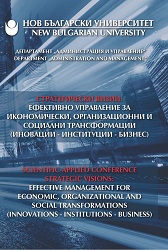
This research report aims to discuss and analyze the risks that arise under the influence of globalization on developing countries and to propose concrete measures to neutralize the negative effects that this difficult for control trend rises. As an irreversible political and economic process, it reflects the continuing expansion and mutual integration in the global market and is a dynamic direction for the development of economies internationally in the beginning of the new millennium. Fast growing importance of information and internationalization of all types of production activities are the two main driving forces of economic globalization. It concludes that the globalization of the financial sector has become the fastest growing and influential aspect of economic globalization. Special emphasis is placed on the role of international finance that serves the needs of international trade and investment activities.
More...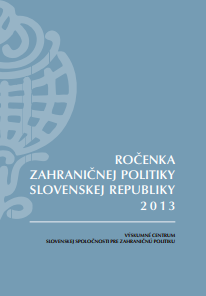
Roku 2013 môžeme pokojne dať nálepku „rok výročí“. Dňa 1. januára 2013 oslávilo Slovensko svoje dvadsiate narodeniny. Takisto sme oslávili naše dvadsaťročné pôsobenie na pôde OSN, dekádu programu oficiálnej rozvojovej spolupráce a pripomenuli sme si, že ubehlo 1 150 rokov od príchodu Konštantína a Metoda na naše územie. Rok 2013 však mal okrem tej oslavnej aj pracovnú dimenziu: pokračoval v zabehanej tradícii globálnych, ale aj regionálnych problémov, bol rokom udalostí, na ktoré naša zahraničná politika, resp. diplomacia musela neodkladne reagovať, a priniesol i situácie, ku ktorým stačilo zaujať stanovisko, či tie, ktorých priebeh verejnosť ani nezaregistrovala. Ambíciou tejto publikácie, ako takmer každý rok opakujem v predhovore, je analyzovať zahraničnú a európsku politiku Slovenska v celej jej komplexnosti na viacerých úrovniach. Je to cieľ ambiciózny, no nevyhnutný aj preto, že zahraničnopolitická, ale i tá európska kritická debata v SR je na iné zdroje, ktoré uchovávajú pamäť o vývine a ďalšom smerovaní zahraničnej a európskej politiky, chudobná. Prirodzene, ako vydavateľ máme limity (primárne finančné), ktoré nás pri tvorbe tejto publikácie obmedzujú v jej rozsahu i forme, a preto sa v ročenke analyzujú hlavne udalosti, ktoré v RC SFPA a v edičnej rade považujeme za tie najdôležitejšie. V roku 2013 medzi takéto témy nepochybne patrili rokovania o rozpočte Únie na roky 2014 – 2020 a jeho schválenie či prehlbovanie hospodárskej a menovej únie. Obísť nemožno ani rozšírenie Únie o Chorvátsko, ktorého členstvo Slovensko dlhodobo podporovalo, či zamyslieť sa nad úspešne neúspešným Vilniuskym samitom Východného partnerstva. Čoraz dôležitejšou témou boli pokračujúce prípravy na naše prvé predsedníctvo v Rade EÚ. V oblasti bezpečnostnej a obrannej politiky v minulom roku rezonovala na ministerstve obrany príprava a publikácia bielej knihy, v medzinárodnom meradle „vytŕčali“ iránsky jadrový program či situácia v Sýrii. Nemohli sme opomenúť ani čoraz intenzívnejšiu spoluprácu vo formáte vyšehradskej štvorky či aktivity našich subjektov v oblasti verejnej diplomacie a rozvojovej spolupráce. Tieto i mnohé (aj keď nie všetky) ďalšie udalosti roka 2013 si našli priestor už v 15. ročenke. Opäť sme sa snažili, aby autori udalosti nielen opísali, resp. odprezentovali, ale poskytli aj svoju analýzu, videnie a odporúčania. Aj preto sme preferovali autorov s odstupom, t. j. z mimovládneho či akademického prostredia. Prvým v zozname autorov, ktorí poskytli svoj pohľad na rok 2013, je opäť minister zahraničných vecí a európskych záležitostí. Ten vo svojom texte prezentuje problémy a aspekty slovenskej zahraničnej politiky z pohľadu inštitúcie zodpovednej za výkon zahraničnej a európskej politiky. Odborná časť sa začína príspevkom Vladimíra Bilčíka, vedúceho európskeho programu Výskumného centra Slovenskej spoločnosti pre zahraničnú politiku (RC SFPA), ktorý analyzuje podstatné udalosti v európskej politike Slovenska počas roka 2013. Základnou tézou príspevku Zsolta Gála z Filozofickej fakulty Univerzity Komenského je, že aj keď v roku 2013 nastal mierny ekonomický rast a stabilizovala sa situácia v eurozóne, Únia čelila a čelí veľkým vnútorným problémom. Kombinácia vysokého dlhu a nízkeho rastu sa preto podľa autora javí ako čoraz reálnejšia hrozba. Slovenskú energetickú politiku v kontexte nášho fungovania v širšom európskom priestore komplexne zhodnotil analytik RC SFPA Karel Hirman. Svoj pohľad na bezpečnostnú a obrannú politiku Slovenska v roku 2013, ktorý uzatvára časť o pôsobení SR v medzinárodnom prostredí, spracoval Róbert Ondrejcsák, riaditeľ Centra pre európske a severoatlantické vzťahy. Základnou myšlienkou jeho textu je, že rok 2013 bol pri kľúčových témach medzinárodnej bezpečnosti rokom kontinuity, no na úrovni ministerstva obrany bola premárnená šanca nájsť riešenie problémov Ozbrojených síl SR. Druhú časť ročenky, ktorá sa venuje prioritným oblastiam našej zahraničnej politiky, otvára príspevok Tomáša Strážaya, vedúceho výskumného programu Stredná a juhovýchodná Európa v RC SFPA, ktorý analyzuje stredoeurópsku spoluprácu v roku 2013. Riaditeľ RC SFPA a vedúci výskumného programu Východná Európa Alexander Duleba ponúka stručný analytický prehľad vzťahov SR s krajinami východnej Európy v roku 2013. Ako poznamenáva, udalosti na Ukrajine nastolili kľúčovú dilemu pre ďalší vývin zahraničnej politiky SR. Slovensko bude podľa neho musieť buď znova a jasne pomenovať svoje priority vo vzťahoch s krajinami východnej Európy, alebo zostať krajinou s nečitateľným postojom voči rusko ukrajinskej kríze, ktorej vyústenie predurčí ďalší vývin v Európe. Slovenské aktivity na západnom Balkáne, kde majú naše aktivity i diplomacia cveng, už tradične hodnotil nezávislý novinár Július Lőrincz. Tretia časť, ktorá sa zaoberá nástrojmi zahraničnej politiky, pozostáva z textu Nory Beňákovej z občianskeho združenia Človek v ohrození a Petra Brezániho z RC SFPA, ktorí svoju pozornosť upriamili na fungovanie rozvojovej spolupráce. Zhodnotili uskutočňovanie cieľov nastavených v dokumentoch, snažili sa poskytnúť sumár aktivít slovenskej rozvojovej pomoci v roku 2013 a v záujme skvalitnenia a zefektívnenia ODA predložili niekoľko návrhov a odporúčaní. Túto časť uzatvára príspevok Ondreja Ga- žoviča z Ministerstva zahraničných vecí a európskych záležitostí SR, ktorý sa zameral na hodnotenie a prezentáciu aktivít slovenskej verejnej diplomacie. Naďalej pokračujeme v rubrike Z histórie slovenskej zahraničnej politiky, ktorej zaradenie je podmienené pripomenutím si významného výročia súvisiaceho s dôle- žitými osobnosťami alebo udalosťami slovenskej zahraničnej politiky. Dvadsať rokov samostatnej slovenskej zahraničnej politiky takouto udalosťou hodnou zaznamenania určite bolo, preto sme do tejto edície zaradili krátku, ale obsažnú analýzu dvoch dekád našej zahraničnej politiky, ktorú spracoval Alexander Duleba. Expertnú časť tradične dopĺňajú prílohy – chronológia dôležitých zahraničnopolitických udalostí, zoznam medzinárodných zmlúv, informácie o štruktúre a predstaviteľoch orgánov štátnej správy pôsobiacich v zahraničnej politike, zoznam diplomatických misií a predstaviteľov SR v zahraničí, diplomatického zboru v SR, informácie o vojenských misiách v zahraničí a podobne. Pevne verím, že aj táto ročenka si nájde cestu k čitateľom a poslúži všetkým, ktorí sa zaujímajú o minulosť, prítomnosť i budúcnosť Slovenska a jeho zahraničnej politiky. Na záver by som sa rád poďakoval Ministerstvu zahraničných vecí a európskych záležitostí SR za spoluprácu na tomto projekte a za to, že vďaka ich podpore sme v budovaní tejto veľmi potrebnej tradície mohli aspoň v tomto formáte pokračovať.
More...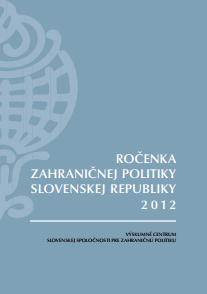
Rok 2012 bol rokom volebným. Opäť došlo k úplnej politicko-mocenskej výmene, a teda i k výmene tých, ktorí za realizáciu zahraničnej politiky nesú ústavnú zodpovednosť. Po prvý raz v histórii Slovenska je minister zahraničných vecí zároveň podpredsedom vlády. Nové funkčné postavenie ministra vo vláde prináša možnosti pohnúť našu zahraničnú politiku (a nielen v inštitucionálnom a vo finančnom zmysle) o krok (skok) vpred. Ostáva veriť, že táto šanca neostane premárnená ako v predchádzajúcom volebnom období, keď bol ministrom zahraničných vecí predseda najsilnejšej koaličnej strany. Niečo už v roku 2012 naznačili aj výrazné inštitucionálne zmeny. Významne sa posilnili kompetencie rezortu zahraničných vecí, ktorý je tak okrem zahraničnej politiky zodpovedný i za koordináciu politík EÚ, krajanskú agendu, jednotnú prezentáciu v zahraničí, presadzovanie obchodno-ekonomických záujmov či za agendu ľudských práv. Koniec koncov, v roku 2012 sa tiež rozšíril názov samotného ministerstva, čím sa zohľadnila jeho koordinačná úloha v oblasti európskych politík. Táto ročenka prináša analytické hodnotenie zahraničnej a európskej politiky, prirodzene, s limitmi, ktoré publikácia tohto typu má. Neanalyzuje všetky oblasti či regióny, v ktorých bola naša zahraničná politika viditeľná či aktívna, ale primárne tie, ktoré považujeme v príslušnom roku za kľúčové. Už tradične je asi tou najdôležitejšou téma vývinu politík a inštitúcií EÚ, ktorá má výrazný dosah na domácu politiku a už dávno nie je doménou výhradne rezortu zahraničných vecí. Roku 2012 dominovala stabilizácia eurozóny a paralelná diskusia o budúcom viacročnom finančnom rámci. Načrtli sa línie ďalšieho postupu, podarilo sa dosiahnuť dohodu o jednotnom dohľade nad bankami, čo je pomerne významný krok smerom k bankovej únii, pokračovala diskusia v rámci štyroch pilierov navrhnutých predsedom Európskej rady. Aj keď sa situácia v súvislosti s krízou v eurozóne navonok upokojila, rok 2012 ukázal, že kríza priniesla zásadné otázky pre ďalší vývin a fungovanie inštitúcií EÚ, ktoré si vyžadujú dlhodobé riešenia. V roku 2012 sa začali prípravy na naše historicky prvé predsedníctvo v Rade EÚ – na ministerstve sa vytvoril koncepčný materiál o východiskách, zasadala medzirezortná koordinačná rada a začala sa budovať databáza expertov. Druhým pomyselným pilierom slovenskej zahraničnej politiky je naše členstvo v NATO, ktorému v roku 2012 dominovala otázka efektívneho využitia zdrojov, partnerstiev (najmä nedostatočná kooperácia s EÚ) či Afganistanu. Okrem toho bolo nevyhnutné sledovať turbulentný vývoj v krajinách Blízkeho východu a severnej Afriky. V oblasti bezpečnostnej politiky okrem uvedených tém stoja za zmienku prípravy bojovej skupiny V4 či úspešné uchádzanie sa našej ambasády v Belehrade o úlohu Kontaktného veľvyslanectva NATO. V oblasti susedskej a regionálnej spolupráce nemožno vynechať spoločný postoj krajín V4 k novej finančnej perspektíve EÚ na roky 2014 – 2020, ktorý prejavili v spoločnej deklarácii prijatej vo formáte V4 + Slovinsko. Aj v roku 2012 platilo, že naše vzťahy so susedmi boli dobré. Vláda pokračovala v nekonfrontačnom štýle komuniká- cie s Maďarskom, čo však neznamená, že sa pretrvávajúce problémy podarilo vyriešiť. Tieto i ďalšie udalosti roka 2012 si našli priestor v 14. ročenke – či už pri bilancovaní nášho pôsobenia a presadzovania cieľov, resp. záujmov v medzinárodnom prostredí, analýze uskutočňovania prioritných oblastí našej zahraničnej politiky, alebo pri hodnotení efektivity nástrojov na jej realizáciu. Prvým hodnotiteľom roka 2012 je po ročnej pauze spôsobenej predčasnými voľ- bami minister zahraničných vecí. Vo svojom príspevku hodnotí a prezentuje problémy a aspekty slovenskej zahraničnej politiky, ktoré hlbšie rozoberajú i ďalší autori, a to, čo našu zahraničnú politiku s novým vedením čaká. Hoci má byť ročenka primárne pôdou na analytické hodnotenie, otvárací príspevok a pohľad ústavného činiteľa, ktorý je za realizáciu zahraničnej a európskej politiky zodpovedný, dáva čitateľovi jedinečnú možnosť nazrieť v rámci jednej publikácie na ten istý „problém“ z rozličných (vecných i politických) uhlov pohľadu. Odborná časť sa tradične začína príspevkom Vladimíra Bilčíka, vedúceho európskeho programu Výskumného centra Slovenskej spoločnosti pre zahraničnú politiku (RC SFPA), ktorý stručne analyzuje podstatné udalosti v európskej politike Slovenskej republiky počas roku 2012. Pohľad Andrey Elschekovej-Matisovej a Romana Lajčiaka z ministerstva zahraničných vecí a európskych záležitostí sa sústreďuje na navrhnuté ekonomické integračné procesy v kontexte prehlbovania európskej hospodárskej a menovej únie, a to vzhľadom na fakt, že ich uskutočňovanie bude v budúcnosti pre vývoj EÚ smerodajné. Základnou tézou príspevku ekonomického analytika na Inštitúte ekonomických a spoločenských analýz Martina Vlachynského bolo, že v roku 2012 sa situácia na jednej strane upokojila, no na druhej strane začalo byť jasné, že ekonomická, finančná a najmä dlhová kríza predstavuje dlhodobý problém, ktorého sa Európa tak skoro nezbaví. Slovenskú energetickú politiku v kontexte nášho fungovania v širšom európskom priestore komplexne zhodnotil analytik z Energy Analytics Michal Hudec. Analýzu bezpečnostnej a obrannej politiky Slovenska v roku 2012 s čiastočným presahom do roku 2013 spracoval Ivo Samson, analytik z Inštitútu bezpečnostných a obranných štúdií na Ministerstve obrany SR. Základnou myšlienkou jeho príspevku je, že Slovensko sa v roku 2012 nachádzalo v prostredí, ktoré umož- ňovalo používanie politických nástrojov na dosiahnutie bezpečnosti a pokúšalo sa aj o konzerváciu svojich vojenských spôsobilostí. Druhú časť ročenky, ktorá sa venuje prioritným oblastiam našej zahraničnej politiky, otvára príspevok Juraja Marušiaka z Ústavu politických vied SAV ponúkajúci pohľad na vývoj slovensko-maďarských vzťahov, v rámci ktorých možno v roku 2012 konštatovať pozitívnu dynamiku, avšak podobne ako v minulosti z nich nevymizli protichodné tendencie. Zásadný význam má skutočnosť, že vládnuce elity oboch štátov si uvedomujú nutnosť stredoeurópskej spolupráce. Tomáš Strážay, vedúci výskumného programu Stredná a juhovýchodná Európa v RC SFPA, aj v tomto ročníku analyzuje naše stredoeurópske aktivity v rámci vyšehradskej spolupráce. Riaditeľ RC SFPA a vedúci výskumného programu Východná Európa Alexander Duleba ponúka stručný analytický prehľad vzťahov SR s krajinami východnej Európy v roku 2012 v rámci dvoch hlavných častí: prvá mapuje vzťahy SR s krajinami Východného partnerstva a druhá je venovaná slovensko-ruskej relácii. Slovenské aktivity na západnom Balkáne, kde majú naše aktivity i diplomacia určitú autoritu, hodnotil nezávislý novinár Július Lőrincz. Tretia časť, ktorá sa zaoberá nástrojmi zahraničnej politiky, pozostáva z textu Nory Beňákovej z občianskeho združenia Človek v ohrození, Petra Brezániho z RC SFPA a Jána Mihálika zo Saleziánov Dona Bosca, ktorí svoju pozornosť upriamili na fungovanie rozvojovej spolupráce. Zhodnotili uskutočňovanie cieľov nastavených v dokumentoch, snažili sa poskytnúť sumár aktivít slovenskej rozvojovej pomoci v roku 2012 a v záujme skvalitnenia a zefektívnenia ODA predložili niekoľko návrhov a odporúčaní. Naďalej pokračujeme v rubrike Z histórie slovenskej zahraničnej politiky, ktorej zaradenie je podmienené pripomenutím si významného výročia súvisiaceho s dôležitý- mi osobnosťami alebo udalosťami slovenskej zahraničnej politiky. V roku 2012 opustil tento svet neorenesančný slovenský diplomat, vysokoškolský profesor, polyhistor, multilingvista, spevák, spisovateľ, skladateľ, výtvarník a športový pretekár, a preto sme do tohtoročnej edície zaradili stať o Jurajovi Králikovi, ktorú opäť spracoval skúsený diplomat a historik Miroslav Musil. Expertnú časť tradične dopĺňajú prílohy – chronológia dôležitých zahraničnopolitických udalostí, zoznam medzinárodných zmlúv, informácie o štruktúre a predstaviteľoch orgánov štátnej správy pôsobiacich v zahraničnej politike, zoznam diplomatických misií a predstaviteľov SR v zahraničí, diplomatického zboru v SR, informácie o vojenských misiách v zahraničí a podobne. Pevne veríme, že aj táto ročenka si nájde cestu k čitateľom a poslúži všetkým, ktorí sa zaujímajú o minulosť, prítomnosť i budúcnosť Slovenska a jeho zahraničnej politiky. Na záver by som sa rád poďakoval Ministerstvu zahraničných vecí a európskych záležitostí SR za spoluprácu na tomto projekte a za to, že vďaka ich podpore sme v budovaní tejto veľmi potrebnej tradície mohli pokračovať aj v tomto roku.
More...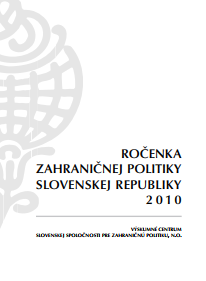
This is only for the second time in the history of this edition, that the Yearbook assesses a year which saw a complete political power shift and thus an exchange of those who make and decide on foreign policy. It was an election year, a year of foreign policy accent shift, and a year of institutional and personnel changes (not only) at the Foreign Ministry. For the first time, the leader of the strongest coalition party became the Foreign Minister; a person with the real political power to move our foreign policy (and not only in the institutional or financial sense) a step (leap) forward. One can only hope that the current Government will also have the political will to do so. The first few post-election months have, however, already provided some indications. First of all, the integration of the diplomatic service, discussed often since 1993, became reality in 2010 and represents an important milestone in the future realization of our foreign policy. Progress was also achieved in strained neighborhood relations. Despite a complicated bilateral agenda, many open issues and rather different approaches, an open confrontation with Hungary was replaced with an unemotional and calm (sometimes even too calm) dialogue supplemented by European solutions. Slovakia’s new “leadership” also changed its stance toward our only neighbor being in a different international regime. It is very positive that our Government came to the understanding that irrespective of the political leadership, supporting the integration process of Ukraine into the EU is a part of our own policy of overcoming regional disparities within Slovakia and thus it is in our state’s interest. Progress was also made in regional cooperation in the field of natural gas supply security (sadly, once again we only resolved to risk-prevention measures after it had happened, but better late than never). It is a new and positive phenomenon in our cooperation with V4 partners and Austria. From Slovakia’s perspective, regional cooperation in energy mainly solves our problem. The loan to Greece along with the European Financial Stability Mechanism, were important issues before as well as after the elections. As of yet, we do not know the answers to gradually emerging questions, but we know that it is in our interest to have a stable currency and a stable euro zone with satisfied citizens. It is therefore crucial to answer the following question first: “Which decisions will contribute to the long-term stability of our currency, the euro.” A significant improvement was also achieved under the former leadership in relations between NGOs and the Ministry, when the NGDO Platform chair and the Foreign Minister signed a Memorandum of understanding in May 2010. It is only good that continuity is clearly visible in this direction after the elections. A positive signal was sent – not only to Europe, but to the entire world – by the determination of our representatives not to celebrate the anniversaries of totalitarian/ authoritarian regimes which violate basic human rights. We must also appreciate the principal position of our diplomacy on awarding the Nobel Prize to a Chinese dissident, on the release of Myanmar’s political prisoners, and the clear position on the Belarusian regime’s repression of its own citizens. These (and many other) events of the (entire) year 2010 are addressed in what is now the 12th Yearbook – whether in an assessment of our performance and promotion of our goals or interests in the international environment, an analysis of the realization of priority foreign policy goals, or in an evaluation of the efficiency and effectiveness of instruments for their realization. Obviously, the book only offers an analytical assessment within the natural limits of the publication of this kind, covering not all the fields and regions in which our foreign policy was visible or active. Slovakia’s President is the first to assess the year 2010 in this year’s edition. Even though the Yearbook is primarily meant for analytical assessments, the editorial board considers an opening address and position of the only supreme official to be in office for all of 2010 to be a positive contribution. Traditionally, the views and opinions of the Foreign Minister are present in the Yearbook. In his contribution, he presents and assesses the issues and aspects of Slovakia’s foreign policy, which are thoroughly examined by other authors in the book, as well as his opinions on the future of our foreign policy under the new leadership. Both texts give the reader a unique opportunity of seeing the same issue from different (this time also politically) angles in one publication. The expert section is opened by the evaluation of Slovakia’s operation in the international environment. The contribution of Vladimír Bilčík from the Research Center of the Slovak Foreign Policy Association (RC SFPA) assessing Slovakia’s performance within the EU is, as always, the introductory text of this section. He addresses issues related to the practical implementation of the Lisbon Treaty and the consequences of the financial and economic crises. He also analyzes how the election campaign prior to the June 2011 parliamentary elections in Slovakia influenced the positions of Slovakia’s politicians in the EU, i.e. the loan to Greece issue, the creation of the European Financial Stability Mechanism, as well as changes in the competences of individual governmental departments. Security and defense policy, or an analysis of our capacities and capabilities to participate on international security respectively, is offered by Ivo Samson, head of the International Security research program at the RC SFPA. He analyzes it through the prism of three key events of 2010: parliamentary elections in Slovakia, the new NATO Strategic Concept, and Slovakia’s strategic review of defense policy process. The ever more serious and urgent issue of climate change is addressed in the text of Juraj Mesík, an independent analyst. He takes a detailed look at developments between the Copenhagen and Cancun summits, including the summit conclusions, and maps the main climate events of 2010 – both in the global perspective and from Slovakia’s point of view – while outlining what the population will have to face in the future. The part focusing on Slovakia’s operation in the international environment concludes with the text of Irina Mattová, from the University of Prešov, characterizing global governance, mapping the agenda of non-formal groups (G8, G20), and indicating the driving forces that will determine the future agenda of these groups in relation to Slovakia. The second part of the Yearbook, focused on the priorities of our foreign policy, is opened by the article of Juraj Marušiak, from the Institute of Political Science of the Slovak Academy of Sciences. He analyzes the issue being rich for developments every year – Slovak–Hungarian relations. Relations with Hungary represented a specific problem encompassing both a foreign and a domestic policy dimension. The domestic policy dimension not only concerned ethnical cleavages on Slovakia’s political scene but also relations between “Slovak” and “Hungarian” political parties within Slovakia respectively. Tomáš Strážay, head of the RC SFPA Central and Southeastern Europe research program, analyzes Slovakia’s Central European activities. Due to the Visegrad 2010 jubilees his analysis is split into two parts: an outline of the key factors that characterized Visegrad cooperation throughout the years and an analysis of V4 priorities in 2010 with an emphasis on the preparation and realization of Slovakia’s V4 Presidency. Director and head of the RC SFPA Eastern Europe research program, Alexander Duleba, gives an analytical “picture” of Slovakia’s relations with both, EU Eastern Partnership countries and Russia, while comparing the policies toward individual countries under the governments of Robert Fico and Iveta Radičová. Slovak activities in the Western Balkans which still belong to the regional priorities of Slovakia’s foreign policy and being a region where Slovakia has a good reputation and trustworthy political positions, were assessed by an independent journalist, Július Lőrincz. The third part of the book, devoted to the foreign policy instruments, is opened by a text from Nora Beňáková, Chairman of the NGDO Platform, Ján Mihálik, from PDCS, and Peter Brezáni, from RC SFPA, who focus their attention on the functioning of our most visible bilateral foreign policy tool – development cooperation. The authors evaluate the practical fulfillment of goals set in documents and attempt to provide an overview of Slovakia’s development assistance activities in 2010. The article offers a set of proposals and recommendations to improve the ODA quality and efficiency. The section dedicated to foreign policy instruments closes with a text by Ondrej Gažovič, from the Institute of European Studies and International Relations of the Faculty of Social and Economic Sciences at the Comenius University in Bratislava, who assesses the changes in Slovakia’s public diplomacy in 2010. He also offers an overview of the practical activities of this policy, the opportunities that were seized and squandered, and a reflection on the future perspective of public diplomacy in the context of Slovakia’s foreign policy. The expert section is concluded with another new thing, the regularly irregular section: The history of Slovak foreign policy. Its inclusion will be conditioned by the commemoration of a significant anniversary related either to an important person or event in Slovak foreign policy. Since 2010 we commemorated the 130th anniversary of the birth of a prominent Slovak diplomat – Milan Rastislav Štefánik, we decided to begin with a study on his diplomatic and strategic successes written by the experienced diplomat and historian, Miroslav Musil. The expert section is traditionally supplemented by annexes, such as the chronology of the most important foreign policy events, a list of international treaties, information on the structure and representatives of state administrative bodies operating in foreign policy, a list of diplomatic missions and representatives of the SR abroad, the diplomatic corps of the SR, information on military missions abroad etc. We firmly believe that this Yearbook will once again find its readers and serve all those who are interested in the past, present, and future of Slovakia and her foreign policy. In conclusion, we would like to thank the Ministry of Foreign Affairs of the Slovak Republic for its cooperation in this project and its support, and for the fact that thanks to this cooperation we are able to continue building this much needed tradition.
More...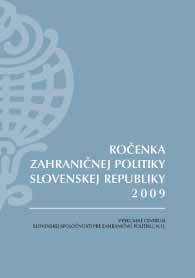
If the foreign policy of any state is to be successful it must have its own form, its own language and be part of public – institutionally framed – discourse. There is, however, no such ‘institutional umbrella’ covering all those responsible for the formulation and implementation of our foreign policy as well as those in Slovakia who are not indifferent to it. Moreover, there is often little will to open such an umbrella ‘over’ our foreign policy. Even the political parties do not pay much attention to foreign policy and thus issues of foreign policy are only occasionally part of the general public discourse. It is, however, the open, coherent and constant exchange of views, opinions, know-how, arguments from experience and/or long-term plans among the groups mentioned that play a crucial role in planning foreign policy. All of these reasons keep convincing us that we need to regularly evaluate where Slovak foreign policy currently is, which important events occurred in the preceding year and what challenges lie ahead of Slovakia in the near future. The Yearbook is in this regard a unique forum primarily focused on Slovakia´s foreign policy. The book provides space for those who make decisions and practically implement them as well as to those who care a lot about the future of foreign policy, such as researchers active in academic circles, think-tanks or non-governmental organizations. The Yearbook is a unique project entering another decade of its existence. It has been contributing for eleven years – and successfully, we are convinced – to the development of a tradition of regular evaluation and analysis of Slovak foreign policy and supporting the cultivation of foreign policy thinking in Slovakia. The publication represents an important, yet at the same time, solitary, and indeed limited, printed book resource keeping record of the development of Slovakia’s foreign policy and the discussion on its further orientation. The Yearbook assesses 2009 as a year rich in events. In 2009, Slovakia celebrated the fifth anniversary of her EU and NATO membership as well as the 20th anniversary of the Velvet Revolution. At the same time it was the very first year of entering the Euro Zone. 2009 will also be remembered as a year of important institutional changes within the EU as well as in its practical operation; a year in which we once again elected our representatives to the European Parliament or one in which the Union got its new President and Foreign Minister. Implementation of the Eastern Partnership program was commenced and the integration project in the Balkans continued. In 2009 discussion on NATO’s new Strategic Concept started, while that on Afghanistan still continued. Within the OSCE Slovakia was very actively participating in the organization’s revitalization. It was also a year when debate on mitigation of the impacts of the economic and energy crisis and their associated challenges predominated. A year, then, of another stage in the improvement of the institutional framework of Slovak foreign policy. In the context of all of these events and their impacts on our foreign policy, the second decade of the Yearbook opens with an assessment of our line of action and a presentation of our objectives and interests in the international environment, continues with an analysis of the realization of the priority areas of our foreign policy and is concluded with an assessment of the efficacy of the instruments required for its implementation. The analytical assessment is again supplemented by an evaluation/ presentation of the Foreign Ministry’s representatives. The Yearbook offers all this to the somewhat limited degree characteristic of such publications. The Yearbook opens for the third time with a survey presented by the Minister of Foreign Affairs. His text evaluates and presents the problems and aspects of Slovakia’s foreign policy that are analyzed in depth by other authors in the Yearbook. Thus the reader is given a unique opportunity to examine the ‘same issue’ from different angles in one publication. The expert section of the Yearbook starts with a text analyzing Slovakia’s performance in an international environment. The first contribution, which by tradition is that of Vladimír Bilčík of the Research Center of the Slovak Foreign Policy Association (RC SPFA), covers the crucial events of Slovakia’s performance in the EU – the issue of representation and operation of the key EU institutions as well as a reflection on the first five years of Slovakia’s EU membership. It analyzes the positions and tasks of the Slovak Republic before and during the European Parliament elections, and in the creation of the European Commission as well as those connected with the process of adoption of the Treaty of Lisbon. It also offers a brief summary of the key issues important for Slovakia’s successful performance within the EU in the upcoming period. The security aspects of our foreign policy are assessed by Matúš Korba from the Center for Security Studies. In his text he analyzes the growing disproportion between the political ambitions of Slovakia within NATO and our real military capabilities that is connected with the internal crisis of the reform process within the Armed Forces of the Slovak Republic, which was even further exacerbated in 2009. The OSCE revitalization, the future of the European security debate and Slovakia’s role in it are all evaluated by Marcel Peško, the Permanent Representative and Head of the Permanent Mission to International Organizations in Vienna. The section on Slovakia’s performance in an international environment is concluded by a contribution by Milan Lapin, a prominent Slovak climatologist. In his article attention is mostly paid to the assessment of knowledge and activities that were carried out in 2009 and relate to climate changes and variability, including the Fifth National Communication of the Slovak Republic on Climate Change. The second part of the book, devoted to the priorities of our foreign policy, opens with a text by the Director-General for Economic Cooperation and ODA at the Ministry of Foreign Affairs of the Slovak Republic Radomír Boháč. In his analysis, he focuses on the fulfillment of a re-established priority of our foreign policy – the economic dimension of Slovak diplomacy – in the context of the global financial and economic crisis and the challenges stemming from it. Urban Rusnák, Head of the Ministry of Foreign Affairs of the Slovak Republic’s project on the External Energy Security of the Slovak Republic, reflects on the gas crisis of January 2009 as well as measures taken in the field of Slovak legislation and infrastructure on the level of national government as well as on the EU level. The analysis of Slovakia’s Central European activities was, as always, written by Tomáš Strážay, an RC SPFA analyst, who reassesses the cooperation principles and mechanisms aimed at rendering cooperation more intensive and more efficient. He also identifies and evaluates the most important challenges faced by the V4 presidency taken up by Slovakia. The key aspects of the Eastern Partnership program, its bilateral and multilateral components, Slovakia’s involvement in it as well as our bilateral activities in relation to the Eastern Partnership states are presented by Juraj Marušiak, a researcher at the Institute of Political Science of the Slovak Academy of Sciences. The final expert section devoted to instruments of foreign policy opens with a contribution by Ján Mihálik from Partners for Democratic Change Slovakia (PDCS) and Peter Brezáni from the RC SFPA, who concentrate their attention on the state of one of the most important bilateral instruments in Slovak foreign policy – development cooperation. The authors offer their perspective on practical fulfillment of objectives set within the official ODA documents, attempt to provide a summary of activities relating to Slovak development cooperation in 2009 as well as a set of recommendations intended to increase the quality and efficiency of Slovak ODA. The expert section concludes with a text by Ondrej Gažovič from the Institute of European Studies and International Relations of the Faculty of Social and Economic Sciences at Comenius University in Bratislava, who evaluates the year 2009 as a year that had brought several factors contributing to clarification of this part of the foreign policy concept against the background of conditions in the Slovak Republic as well as to its institutionalization and practical implementation. The expert chapters are traditionally supplemented by annexes such as a chronology of important foreign policy events, a list of international treaties, information on the structure and representatives of state bodies operating in foreign policy, a list of diplomatic missions and representatives of the Slovak Republic abroad, a list of diplomatic corps in the Slovak Republic, information on military missions abroad etc. We firmly believe that the first issue of the Yearbook in the second decade of its existence will once again find a readership and serve all those who are interested in the past, present and future of Slovakia and her foreign policy. In conclusion, we would kindly like to express our gratitude to the Ministry of Foreign Affairs of the Slovak Republic for its cooperation on this project and its support as well as for the fact that thanks to this support we are able to continue building on this much needed tradition.
More...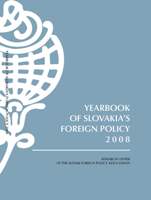
The very first Yearbook of Foreign Policy of the Slovak Republic, published in 2000 and mapping the year 1999, outlined the aim of this unique project as follows: “The demand of society to regularly publish a Yearbook containing opinions and assessments of the state’s foreign policy stemmed from the need to record the development of foreign policy, during a crucial period in the country’s development, in a form accessible to the expert public […] In Slovakia, the requirement to publish the Yearbook is further bolstered by two factors: by an excessive dependency of foreign policy trends upon the current government coalition […], as well as the lack of an official almanac of foreign policy documents. From this perspective, it is a shame that the first issue of the Yearbook is only being published in the eighth year of Slovakia’s existence. We can only take solace in the motto – ‘better late than never’. Probably the best evidence that this aim has been successfully fulfilled is the fact that this year, the Yearbook celebrates its tenth anniversary. During the first decade of its existence, it built and maintained a specific position in public discussion on foreign policy and remained a unique and original source of information, opinions, knowledge, experience, viewpoints, and arguments of the actors themselves, academics, analysts, or journalists with the goal of improving the quality of the decisions made in foreign policy, in order to best serve the interests of this country. We are still convinced that it is necessary to maintain this tradition of regularly evaluating, in book form, where Slovak foreign policy currently is, which important events occurred the preceding year, and what challenges lie ahead of Slovakia in the near future. These were, and still remain, the main goals and objectives of this edition as well and we believe that they will be the same in future ones. In the course of its 10 year life, the Yearbook has undergone a number of changes. It started out as a publication from the foreign policy review conference and then gradually became a publication in its own right, with its own clearly defined structure and base of authors. The Yearbook has had two publishers, three editors, and six different colors on the cover with two graphic motifs. It has been published 10 times in Slovak and 9 times in English. Both language variations came to 3,771 pages, with the contributions of 93 different authors in 139 analyses filling 1,227 pages in the case of the Slovak version and 1,161 pages in the English one. The annexes ‘filled’ 637 or 606 pages respectively. Among the authors were two presidents of the Slovak Republic, four speakers of the National Council of the Slovak Republic, one prime minister of the Slovak Republic, four deputy prime ministers, three ministers of foreign affairs, five ministers of defense and one minister of finance of the Slovak Republic, one high representative and EU special representative in Bosnia and Herzegovina, one representative of the World Bank, eleven opposition and governing coalition MPs and chairmen of the Committees of the National Council of the Slovak Republic, eight academics, twenty-eight analysts, twenty-seven representatives of the Ministry of Foreign Affairs and one of the Ministry of Economy of the Slovak Republic, and two journalists/publicists, while some appeared in the Yearbook more than once holding different posts. Eight proofreaders, ten reviewers, and fifteen members of the editorial board cooperated on the Slovak version. The English version was compiled by sixteen translators and seven different proofreaders. This year’s Yearbook assesses the year 2008 and Slovak foreign policy in an already established thematic structure. It evaluates our conduct in the international environment, the realization of the priority areas of our foreign policy, as well as the efficacy of its instruments and the institutional framework required for its implementation. Based on positive feedback from readers, this year we have also included the insights of the Minister of Foreign Affairs in the introduction. The Minister looked back over the past 12 months from the perspective of the person bearing responsibility for the formulation and implementation of foreign policy in this electoral term. The text evaluates the problems and aspects of Slovakia’s foreign policy, which are analyzed in depth by other authors in the Yearbook. Thus, the reader is given a unique opportunity to peruse the same ‘issue’ from different angles in one publication. The expert section of the Yearbook opens with a contribution by Vladimír Bilčík from the Research Center of the Slovak Foreign Policy Association (RC SFPA) who provides an overview of the fulfillment of the main political, economic, and institutional priorities of the Slovak Republic as a member state of the EU. He analyzes Slovakia’s international behavior, offering a cross-section analysis of the fundamental political priorities of the Slovak Republic in the EU, and also assesses the ability of the country to formulate and promote its interests within the EU. The security policy aspects of our foreign policy are analyzed by Matúš Korba from the Center for Security Studies. In his analysis, he identifies how Slovakia was able to cope in the first five years of its membership in NATO with the challenges of actively participating in the political activities of the Alliance, the military operations of crisis management and the tasks it is currently fulfilling within a transforming NATO. The section focusing on Slovakia’s performance within the international environment is concluded by the text by Martina Hrvolová from the Human Rights, Council of Europe, OSCE, and Minorities Department of the Ministry of Foreign Affairs of the Slovak Republic, who analyzes our first chairmanship of the Committee of Ministers of the Council of Europe. The second part of the book, devoted to the priorities of our foreign policy, opens with a contribution by the Director General for Economic Cooperation and Official Development Assistance of the Slovak Foreign Ministry, Radomír Boháč. In his analysis, he focuses on the fulfillment of the re-established priority of Slovak foreign policy – the economic dimension of Slovak diplomacy – in the context of the global financial and economic crisis and the challenges stemming from it. Ján Petrovič, Director of the Energy Policy Department of the Ministry of Economy of the Slovak Republic, concentrates on an area that is crucial to Slovak policy and that of the European Union – energy security. Freelance journalist Július Lőrincz offers a perspective on Slovak activities in the Western Balkans in 2008 in three areas – economic diplomacy, development assistance, and the issue of Kosovo. The analysis of Slovakia’s Central European activities was, as always, written by Tomáš Strážay, analyst of the RC SFPA, who summarizes the priorities of two Visegrad presidencies – the Czech and the Polish, and focuses on the problematic points of the agenda as well as Slovakia’s contributions during both presidencies. The Director and Head of the RC SFPA Eastern Europe research program, Alexander Duleba, offers a ‘picture’ of the key events, in addition to a brief analysis on the development of Slovakia’s relations with three eastern neighbors – Russia, Ukraine, and Belarus in 2008. The final expert section of the book is devoted to the institutional framework and foreign policy instruments, and opens with a contribution by the Secretary General of the Ministry of Foreign Affairs of the Slovak Republic, Marcel Peško. In his chapter, he looks back at the year the institutional reform of the Ministry of Foreign Affairs was implemented. The expert section of the Yearbook concludes with a contribution by Vladimír Benč and Peter Brezáni from the RC SFPA, who concentrate their attention on the state of the most important bilateral instrument in Slovak foreign policy in 2008 – development assistance. The authors offer their perspective on the institutional and legislative changes, and attempt to provide a summary of the activities concerning Slovak development assistance in 2008. The expert chapters are traditionally supplemented by annexes, such as the chronology of important foreign policy events, selected political documents, a list of international treaties, information on the structure and representatives of the state bodies operating in foreign policy, a list of the diplomatic missions and representatives of the Slovak Republic abroad, the diplomatic corps of the Slovak Republic, information on military missions abroad, and so on. We firmly believe that the tenth edition of the Yearbook will once again find a readership and serve all those who are interested in the past, present, and future of Slovakia and Slovak foreign policy. In conclusion, we would like to express our gratitude to the Ministry of Foreign Affairs of the Slovak Republic for its cooperation on this project and its support, and for the fact that thanks to this cooperation we are able to continue building this much needed tradition.
More...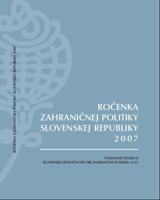
The Yearbook of Slovakia’s Foreign Policy is a unique project which has for the past nine years been, we hope that successfully, contributing to the development of the tradition of the regular evaluation and analysis of the foreign policy of the Slovak Republic in the given year and supporting the cultivation of the foreign policy debate. This publication represents a significant and at the same time the only book source keeping record of the development of Slovakia’s foreign policy and the discussion on its further direction. The foreign policy of every country needs to build its own traditions especially in the case of a young state such as the Slovak Republic. Should the foreign policy be successful it must have its own form, its own language and its own institutions. In this sense under the term institutions it is necessary to comprehend not only the buildings of state bodies which are occupied by those who are responsible for the formulation and implementation of foreign policy. In a democratic state the public discussion is a part of the formulation of all public policies and foreign policy is not an exception. It is very important that public discussion gains institutional forms which become a tradition because without traditions there is no continuity and the absence of continuity means the repetition of old mistakes and always starting from point zero. In other words tradition is institutionalized memory. New knowledge is impossible without memory and without knowledge there can be no good political decisions. That is why traditions are so important especially in an area such as the foreign policy of a state. In this context it is possible to see the exceptionality of this publication as a ‘tradition’ as well as its specific position in the public debate on Slovakia’s foreign policy. It is a unique forum primarily dedicated to Slovakia’s foreign policy which provides space for those who bear the responsibility for the realization of the foreign policy of this country and those who are not indifferent to Slovakia’s foreign policy. The Yearbook serves for the exchange of opinions, knowledge, experience, positions and arguments with the goal of improving the quality of decisions in the area of foreign policy to best serve the interests of this country. We are convinced that it is very important to regularly evaluate the state of Slovakia’s foreign policy, which crucial events occurred in the past year and what challenges stand before the Slovak Republic in the near future. These were the main goals and intentions of the previous Yearbook editions; we prepared this year’s edition with identical objectives and we believe that we will do the same in the following years. The 2007 Yearbook evaluates the year of our foreign policy in the traditional structure. It analyzes Slovakia’s operation in the international environment, the realization of the priority areas of our foreign policy as well as the effectiveness of the instruments of its implementation. The introductory contribution of the Minister for Foreign Affairs of the Slovak Republic is however an exception compared to previous years. It summarizes and evaluates the foreign policy of the past 12 months from the viewpoint of the person bearing the responsibility for the formulation and implementation of foreign policy throughout the electoral term. This text thematically corresponds to individual chapters in the Yearbook which gives the reader the unique opportunity of seeing the same issue from two different angles. The expert section of the Yearbook is opened by the contribution of Vladimír Bilčík from the Research Center of the Slovak Foreign Policy Association who focuses on the process of the completion of the integration process as well as the challenge of the active contribution to the formation of the future EU which stands before the SR in the upcoming period. Our Permanent Representative to the UN Peter Burian evaluated the goals and conditions of our operation in the UN Security Council, analyzed threats and their solutions and didn’t leave out a thorough analysis of our February presidency. Tomáš Valášek, the Director of Foreign Policy and Defense at the Centre for European Reform in London, concluded the first chapter with his view of the Slovak security policy and our operation in foreign missions. The second section of the Yearbook devoted to the priority areas of our foreign policy is opened by the article of the High Representative of the International Community for Bosnia and Herzegovina and EU Special Representative in Bosnia and Herzegovina, Miroslav Lajčák. In his contribution on Slovak policy in the Western Balkans he instigates a reflection upon how most of all the EU but also NATO could strengthen our positions and how to maintain our long-term specialization on this agenda. Tomáš Strážay, RC SFPA analyst, focused his attention on the successes and some problematic areas of the cooperation of V4 countries as well as to the resolutions which they were not able to fulfill but which could increase the significance and effectiveness of the V4 in the near future. Alexander Duleba, RC SFPA Director and Head of the East European research program, attempted to evaluate the development of the political and economic agenda of Slovak relations with its eastern partners in the year 2007 including the fulfillment of the new foreign policy priority – the economic dimension of Slovak diplomacy. The contribution of the Ministry of Foreign Affairs of the SR to external energy security was addressed in the article of Ján Šoth, the Director of the Analyses and Policy Planning Department and the Head of the Standing Work Group on External Energy Security. The concluding part of the expert section which is devoted to the institutional background and foreign policy instruments is opened by the contribution of the Ministry of Foreign Affairs Secretary General Marcel Peško on the modernization of the Slovak Foreign Service and the future character of the Ministry of Foreign Affairs of the Slovak Republic. The representatives of the Slovak Non-Governmental Development Platform Eva Havelková and Nora Beňáková focused on the functioning of presumably the most important bilateral instrument of the Slovak foreign policy in the year 2007 – development assistance. The authors offered their view of the institutional and legislative changes in the Slovak ODA and tried to compare the territorial and sector objectives of bilateral projects in the periods before and after the realization of said changes. The expert segment of the Yearbook is closed by the contribution of the Director of the International Economic Cooperation Department of the Ministry of Foreign Affairs of the Slovak Republic Jaroslav Chlebo which is devoted to the possibly most frequently cited collocation in this electoral term – the economic dimension of diplomacy. The expert section is traditionally supplemented by annexes such as the chronology of the most important foreign policy events, chosen political documents, a list of international treaties, information on the structure and representatives of state administrative bodies operating in foreign policy, a list of diplomatic missions and representatives of the SR abroad, SR diplomatic bodies, military missions abroad etc. We firmly believe that also this year’s Yearbook edition will find its readers and serve to all those who are interested in the past, present and future of Slovakia as well as its foreign policy. In conclusion we would like to thank the Ministry of Foreign Affairs of the SR for its cooperation in this project and its support as well as for the fact that, also thanks to this institution, we can continue in building this much needed tradition.
More...
Year 2006 was indeed exceptional for both Slovakia’s foreign policy and the publication itself. In June, after the general elections, the new government was formed. It was the first time since 1998 the complete change of the political power took place at the same time as the change of foreign policy creator took place. It is also the first time the Yearbook of Foreign Policy of the Slovak Republic assesses and reflects Slovak foreign policy issues other than Dzurinda’s government. Nevertheless, the field of foreign policy was perhaps the only one within which continuity was expected. Furthermore, the Government’s Manifesto does not differ that much in terms of values from the previous government’s manifesto and that was further confirmed by the nomination of an experienced diplomat, Ján Kubiš, for the position of foreign minister. However, certain dissonance between the rhetoric and implementation has been provoking the discussion from the very beginning. At the beginning of April 2007, the Research Center of the Slovak Foreign Policy Association (RC SFPA) attempted for the first time to assess the foreign policy direction of Slovakia after the new government came into power. RC SFPA organized its Annual Review Conference on Foreign Policy named Continuities and Changes in Slovakia’s Foreign Policy. The name of the conference itself, somehow stemming from the post-election discourse, caused quite a vivid discussion. However, the individual presenters constantly substituted and by or in the title. This also might have contributed to our decision to continue with the discussion on the pages of Yearbook of Foreign Policy of the Slovak Republic 2006 in broader scope. The book analyzes the 2006 foreign policy within three main fields – EU, security policy, and regional and bilateral agenda. The first part traditionally focuses on Slovakia’s performance in the EU. It opens with the contribution of Erik Láštic from Comenius University’s Faculty of Arts. In his paper, he analyzes the institutional background of Slovakia in the EU. Since this topic was not discussed in previous editions, the text goes beyond the framework of 2006. The article of RC SFPA’s research fellow Aneta Világi reflects the domestic (non)debate on the issue of the Treaty Establishing the Constitution for Europe. The RC SFPA director and head of its Eastern Europe research program Alexander Duleba, based on his analysis of the EU Eastern Policy, recommends the establishment of two-level strategy and bridging ENP with Russia policy. The second part also partially resembles the last year’s structure with its two analyses focusing on the key security policy agendas, i.e. Slovakia’s performance within the UN Security Council and NATO. The former was elaborated by the head of RC SFPA’s International Security research program Ivo Samson. His detailed analysis focuses on the scope of SR’s activities in the UN SC, Slovakia’s participation in creating of resolutions and voting, the presidency itself as well as the key agenda of the security sector reform. The transformation and developments within the NATO are surveyed by Matúš Korba of Center for Security Studies, a Bratislava-based NGO. In his study, included the analysis of Slovakia’s performance in the Alliance, the participation in the crisis management missions or the challenges the SR will face. Unlike previous years, the 2006 Yearbook has a part dealing with regional and bilateral relations, i.e. it focuses on the priorities and tools of Slovakia’s foreign policy. The chapter is opened by the article on Slovak-Hungarian relations which are, according to the author, full of ‘media convenient’ topics. The paper was written by Kálmán Petőcz of Forum Minority Research Institute, a Šamorín-based NGO. Similarly discussed and ‘convenient’ topic was also energy policy and security. Independent analyst, Karel Hirman, focuses his analysis on 2006 Russian-Ukrainian gas dispute, new Russian strategy and its impact on Slovakia. Slovakia’s presidency over the V4 dominated the regional agenda even though the functioning of V4 was to a large extent influenced by the domestic political developments in its member states. This topic was elaborated by Juraj Marušiak of Institute of Political Science of Slovak Academy of Science. Milan Šagát of Bratislava based Pontis Foundation prepared a contribution on a complex and complicated issue of Slovakia’s policy towards the Western Balkans. In his paper, he stresses the fact that the folowing period will be of crucial importance for Slovakia’s policy and that it needs to be more diversified and better-balanced towards the whole region. Three authors Marián Čaučík, Zuzana Krátka and Ľudmila Pastorová focused on the issue of the most important bilateral foreign policy tool of Slovakia in 2006 – the development assistance. Their contribution deals with the activities of Slovak organizations within sectoral and territorial priorities as well as with the institutional and legislative changes of Slovak ODA. Traditionally, the Yearbook includes annexes such as the chronology of the most important events in the Slovak foreign policy in 2006, selected political documents and other information (e.g. the structure and representatives of the MFA SR, a list of diplomatic missions and representatives of SR abroad, the SR diplomatic bodies, army missions abroad etc.). It is up to the reader to decide whether there is continuity or discontinuity in Slovakia’s foreign policy. However, I strongly believe that all texts will contribute to the debate on further direction of Slovakia’s foreign policy and that the publication will find its readers.
More...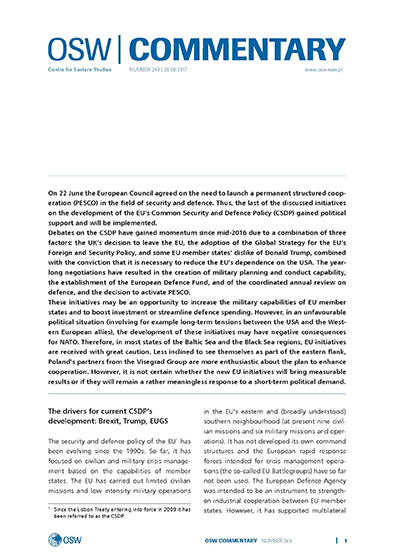
The peace deal agreed on 5 September 2014 concerning the ceasefire in the region covered by the conflict in the Donbas brought about a significant reduction in the scale of military clashes. However, in mid-January the separatist forces, supported by the Russian military, started an offensive along the entire front line. For example, they seized the airport in Donetsk and the village of Krasnyi Partyzan. About a third of the Donetsk and the Lugansk oblasts currently remain outside Kyiv’s control (see Map). Before the war, these areas were inhabited by 6.6 million residents, 15% of Ukraine’s total population. The process launched in September 2014 in Minsk, which was intended to regulate the conflict within the so-called trilateral contact group (Ukraine, Russia, the OSCE and representatives of the separatists), resulted in an exchange of some prisoners of war, although it failed to have any political effects. Attempts at regulating the political situation were additionally complicated by the illegal ‘elections’ of leaders of the two separatist regions, the so-called Donetsk and Lugansk People’s Republics (the DPR and LPR).
More...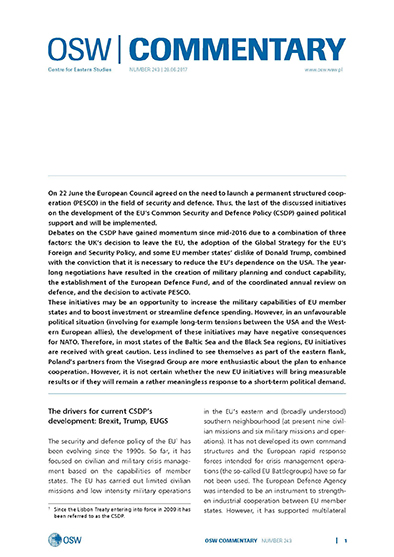
Over the past three years, a distinct change has become visible in the ideological discourse of the government of Belarus. To an increasing degree, the state ideology is focusing on strengthening national identity, emphasising the divergence of Belarus’s interests from those of Russia, and re-examining the historical narration in a direction which emphasises the distinctiveness of the history of Belarus from that of Russia. Above all, the government has changed its attitude towards the Belarusian language and culture. A campaign promoting the Belarusian language is being carried out on a large scale – under the auspices of state ideologues. The government has also become involved in the promotion of vyshyvanki, traditional, embroidered Belarusian clothes and their ornamentation. This allows us to talk about a process of ‘soft Belarusianisation’. Articles criticising Kremlin policy have begun to appear fairly regularly in the government media. Official representatives of the authorities, while not going so far as to promote the idea of friendship with the West, no longer refer to it using the rhetoric of the ‘enemy’, as was previously the case. This modification of ideological discourse probably means that the regime is looking for new ways to arrange its relationships, both with its own society and with the countries of the West. This does not mean, however, that the authorities are ready for systemic changes. The role of the President and the concept of the state remain unaltered in ideological discourse; there is still no tripartite division of power, and civil society’s room for manoeuvre remains narrow.
More...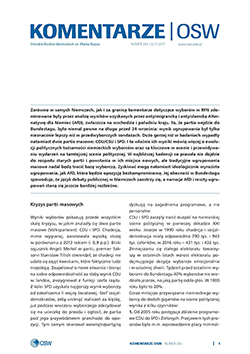
Over the past three years, a distinct change has become visible in the ideological discourse of the government of Belarus. To an increasing degree, the state ideology is focusing on strengthening national identity, emphasising the divergence of Belarus’s interests from those of Russia, and re-examining the historical narration in a direction which emphasises the distinctiveness of the history of Belarus from that of Russia. Above all, the government has changed its attitude towards the Belarusian language and culture. A campaign promoting the Belarusian language is being carried out on a large scale – under the auspices of state ideologues. The government has also become involved in the promotion of vyshyvanka, traditional, embroidered Belarusian clothes and their ornamentation. This allows us to talk about a process of ‘soft Belarusianisation’. Articles criticising Kremlin policy have begun to appear fairly regularly in the government media. Official representatives of the authorities, while not going so far as to promote the idea of friendship with the West, no longer refer to it using the rhetoric of the ‘enemy’, as was previously the case.This modification of ideological discourse probably means that the regime is looking for new ways to arrange its relationships, both with its own society and with the countries of the West. This does not mean, however, that the authorities are ready for systemic changes. The role of the President and the concept of the state remain unaltered in ideological discourse; there is still no tripartite division of power, and civil society’s room for manoeuvre remains narrow.
More...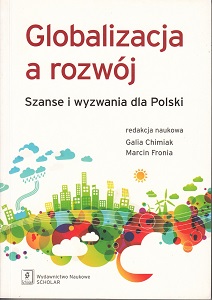

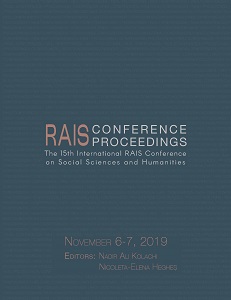
This paper discusses the disorder that characterizes the legal order of the modern state in parts of Africa. The capacity to maintain law and order and to exercise monopoly over means of coercion constitutes some of the raison d’etre of the Westphalian state model that pervades every nook and cranny of the continent. However, the inability of the state to meet the existential exigencies of its citizens and, ipso facto, its consequent loss of legitimacy, has generated a groundswell of discontent that has triggered the emergence of centrifugal forces – non-state actors – variously described as rebels, insurrectionists, insurgents, armed bandits, separatist agitators, terrorists, amongst others. But although these forces initially set out as viable alternatives to the state, they soon lose track and threaten not only the peace and security of the state but also of everyone else including their compatriots and neighbouring or contiguous states. Amidst the incapacity of the state to reclaim its lost power or glory, these non-state actors create a jungle order that harks back at Thomas Hobbes’ state of nature where life is short, nasty and brutish. Such has become the lot of so many states in Africa. From Nigeria to Central African Republic through the Democratic Republic of the Congo to Somalia, the narrative is similar. This paper examines the background and the foreground of the failure of the legal orders of the state, the disaster that armed non-state actors have become for their compatriots and territorial neighbours and the reluctance of the international community to effectively respond to restore order. Finally, the paper suggests some ways in which the legal order of the state can be rejuvenated in such a way as to be able to meet contemporary needs of law and order on the one hand and freedom and liberty on the other.
More...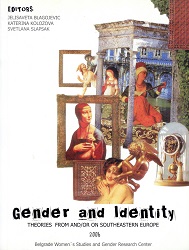
THE TEXT REVISITS THE BALKAN INVENTION BY THE WEST AND PROVIDES A SCHEME OF REGIONAL REACTIONS. THE PARADOX OF MASCULINE IMAGE OF THE BALKANS REQUIRES RE-EXAMINING OF THE IMAGERY OF INVISIBILITY, MONSTROSITY, HYBRIDITY, INBETWEENNESS, UNDER PART AND VISCERA OF THE EUROPEAN CORPUS. THE STIGMA OF THE DEGENERATE NEGLECTED MALE INSCRIBES THE BALKANS INTO THE CONDITION OF BASTARDISED FOREFATHERS. FOREFOTHERS. FOUR MAIN BALKAN ARTISTIC AND DISCURSIVE RESPONSES ARE EXAMINED: OF THE DECENT OTHER, OF THE EUROPEAN AFFILIATE, OF THE BALKANIST CRITIQUE, AND PARTICULARLY OF FESTIVE INTERAGENCY.
More...
THE PAPER DEALS WITH THE CONCEPT OF WOMEN'S MOBILITY IN ALL ITS SEMIOTIC VARIETIES, FROM TRAVELLING, NOMADISM, TO TRANSGRESSING POLITICAL AND CULTURAL BORDERS, SUBVERTING STEREOTYPAL NATIONAL DELIMITATIONS, TRANSLATING (LANGUAGE AND CULTURE), DEROUTING MEMORY LANE. STARTING FROM ROSI BRAIDOTTI'S »NOMADIC SUBJECT«, THE PAPER FOCUSES ON LOCAL KNOWLEDGE AND POSITIONING AND MULTIPLE LOYALTIES OF WOMEN IN THE BALKAN AREA. THROUGH THE SPECIFIC ACTIVIST EVENT (A GROUP OF WOMEN PEACE-ACTIVISTS TRAVELLING THROUGH THE TRAUMATIC AREAS AND COLLECTIVE MEMORY PRESENTATION OF ALL THE SIDES IN THE RECENT YUGOSLAV WAR AND IN ALBANIA IN 2002), THE THEORIZING IS WINDING THROUGH A DIFFICULT SPACE OF STEREOTYPES, COLONIAL INVENTIONS AND COLONIZED WISDOM IN AN ATTEMPT TO CHART A NEW SITUATEDNESS AND TO DECONSTURCT THE SELFPRESENTATION AND THE FORCED UNIVERSALIZED PRESENTATION OF THE FEMININE IN THE BALKANS.
More...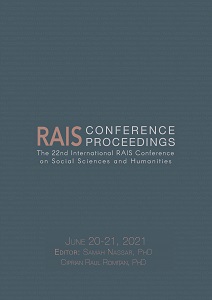
The concept of public diplomacy is one of the trending approaches in modern international relations and diplomacy. Communicating and engaging effectively with the foreign public in a particular nation by a government to achieve its foreign policy objective is every government’s goal. The field of public diplomacy as an academic discipline in Ghana in particular and Africa has not received much attention compared to the Western World. This article attempts to bridge this gap by opening Ghana’s public diplomacy to academic scrutiny that has, as yet, been underdeveloped. This paper’s principal objective is to bring to light the public diplomacy instruments used by the indefatigable first president of Ghana, Dr. Kwame Nkrumah, to propagate his pan-Africanism foreign policy in the 1960s against capitalism and communism after Ghana’s independence. It also looks briefly at Nkrumah’s general foreign policy agenda through the lens of public diplomacy. Methodologically, it uses content analysis of documents to explore how Nkrumah adopted the public diplomacy tactics during his presidency to sell his foreign policy. The article explores the topic under the theoretical framework of Golan’s Integrated Public Diplomacy model. It concludes that public diplomacy under Kwame Nkrumah should be the foundation and ignite its incorporation into Ghana’s tertiary education and current foreign policy strategies.
More...